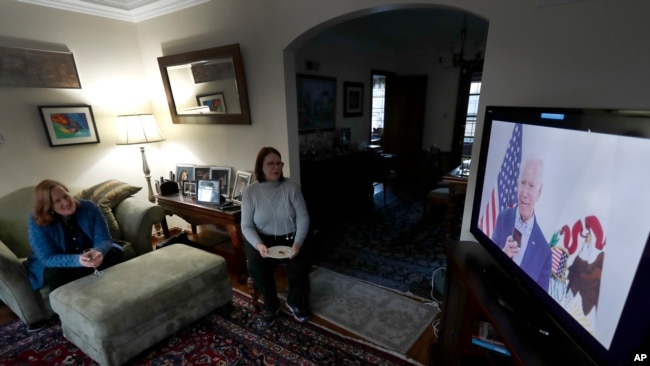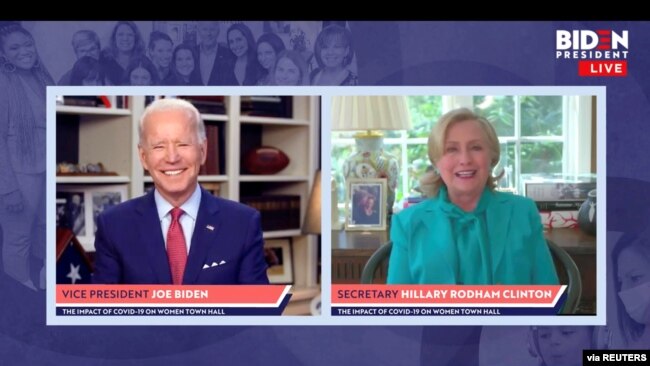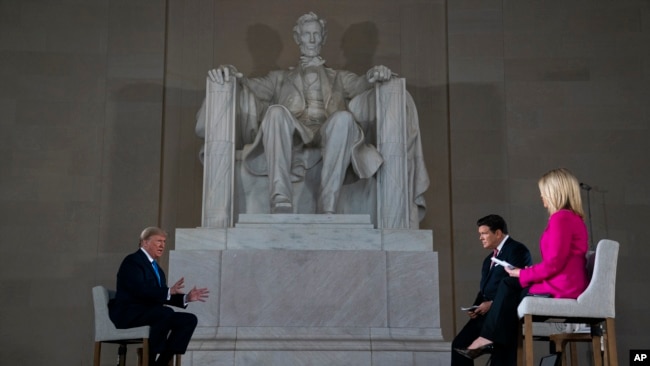As the novel coronavirus continues to spread in the United States, politicians are increasingly turning to technology to get their message out to voters.
Public health guidelines for reducing the spread have led to changes in the political campaigns of President Donald Trump and former Vice President Joe Biden.
Health officials have appealed to Americans to limit face-to-face contact with others. They support calls for social distancing keeping space between yourself and other people outside your home.
With social distancing rules in effect, the presidential election campaigns were faced with an unusual situation. They were no longer able to send out organizers and volunteers to connect with likely voters face-to-face. It has also not been possible for candidates to hold events that can raise millions of dollars for their campaigns.
Eric Wilson is a technology expert working for the Republican Party. He directs the Center for Campaign Innovation. He told VOA the coronavirus health crisis forced big changes, such as the move to completely “virtual” campaigns.
“Just like the (coronavirus) disrupted everyone else's daily life - the same is true of our campaigns,” Wilson said.

Lally Doerrer, right, and Katharine Hildebrand watch Joe Biden during his Illinois virtual town hall, in Doerrer's living room Friday, March 13, 2020, in Chicago. (AP Photo/Charles Rex Arbogast)
Tara McGowan is the founder of Acronym, a political organization that supports progressive causes and candidates. She agrees that campaign organizers have had to find many new ways to reach the people most likely to support their candidates.
“You're just seeing a lot more creativity in terms of how and where the campaigns are finding the voters they need to get their message across to,” McGowan told VOA.
Since the start of social distancing orders in March, the Trump campaign has launched a daily talk show on social media. The show – which appears on services such as Facebook and YouTube – has different guests each day.
Some well-known Republicans and members of Trump’s family have appeared on the program as guests or presenters. During one show, the president’s son, Donald Trump, Junior, asked his father questions.
“That's one of the biggest kind of innovations we've done,” said Erin Perrine, the director of press communications for the Trump campaign.
The Biden campaign is also turning to social media to reach voters. It has used Instagram to hold discussions with well-known people and politicians. Last week, Biden raised more than $11 million during a virtual fundraising event with former President Barack Obama.

Democratic U.S. presidential candidate Joe Biden smiles as former Secretary of State Hillary Clinton endorses him for president in a video screengrab made during an online town hall, in Wilmington, Delaware, April 28, 2020. (Biden For President/Handout)
Even as both campaigns experiment with ways to reach possible donors and voters, the use of technology in presidential campaigns is not new.
Candidates have been using the internet since 1996, the year presidential hopefuls first developed websites for their campaigns. In 2000, Vice President Al Gore, a Democrat, and Republican Senator John McCain held online chats during their presidential runs.
By 2004, campaigns started experimenting with ways to use the internet to connect with supporters and to help organize them, said Jennifer Stromer-Galley. She studies political campaigns and the use of technology at Syracuse University in New York.
In 2008, then-presidential candidate Barack Obama used social media services like Twitter and Facebook to help him win the election.
Stromer-Galley said the 2020 election season could be the first where campaigns spend more money on internet advertising than on television ads.

President Donald Trump speaks during a Fox News virtual town hall from the Lincoln Memorial, May 3, 2020, in Washington.
She told VOA that internet-based ads are helpful in getting people to provide contact details after opening the ads. “The first thing the campaign says is, ‘Hey, give me your email address.’ And if you do give your email address, they also then typically ask you for your name and maybe your address or your zip code.”
Stromer-Galley said Facebook can be a useful tool for campaigns because ads can be created to target demographics of users. “Facebook has built an algorithm that predicts if you're politically interested. They have an algorithm that predicts if you're likely a Democratic supporter or a Republican supporter.”
Erin Perrine of the Trump campaign says it runs a lot of ads on Facebook continuously. “We do a bunch of them and those that are doing well, we’ll put more money behind and continue to push those, then others that aren’t, you can pull them off the platform,” she said.
Words in This Story
virtual – adj. not real, existing in cyber space
disrupt – v. to interrupt something and stop it from continuing
guest – n. a person who comes to visit
innovation – n. a new idea or method of doing something
chat – n. an informal talk with someone
address – n. the details of where a building is located
zip code – n. a set of numbers that go after a person's address
demographic – n. the study of populations and the different groups that make them up
algorithm – n. a set of steps that are followed in order to solve a mathematical problem or to complete a computer process
platform – n. the type of computer or smartphone system you are using


